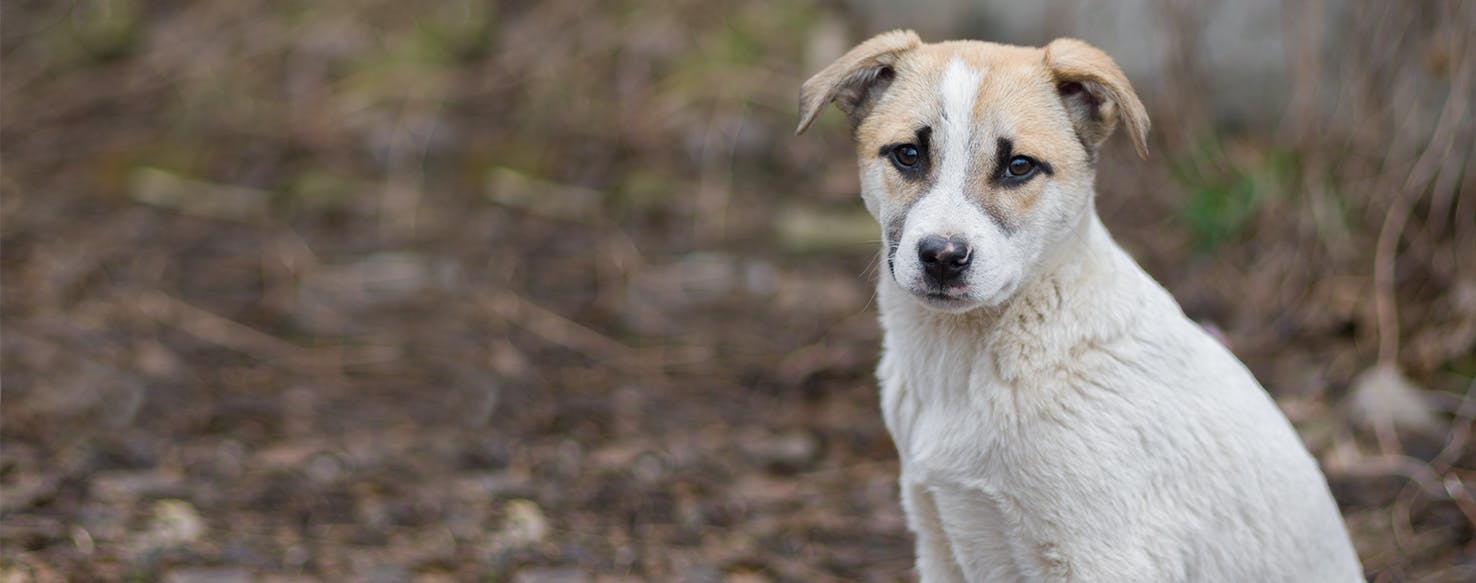- Home
- The Daily Wag!
- Senses
- Can Dogs Feel Self-Conscious?

You've felt it before... when your face flushes and your palms get sweaty. You might try to play it off or even run away - but no matter how you slice it, you're feeling self-conscious. It's not a fun feeling, and it usually turns into the things you lay awake at night regretting, but could your pooch possibly empathize with you?
It's an interesting question since it doesn't seem like dogs can get flushed like we can. Read on to find out!
Theoretically, if your dog were to feel self-conscious or embarrassed, how would they act? Well, for starters, they might put their tail between their legs. In fact, "leaving with your tail between your legs" is a popular saying that describes an embarrassed or sheepish human too. Another thing you might notice is their ears might be down, they might cower, and they might even whimper a bit.
It doesn't stop there, though. Your dog might even try to lay down on the ground or try to hide their face in their paws. Some dogs might try to run away, and other might just sit and look at you sheepishly. Dogs are a lot smarter than we give them credit for, and they might have a better understanding of whatever they did than you think they do. Think about it, if your dog is potty trained, they know enough to go outside and to feel timid when they use your carpet instead.
Body Language
Here are some signs you might notice if your dog feels self-conscious:
- Cowering
- Ears Drop
- Whimpering
- Tail Tucking
Other Signs
Here are some other signs you might notice if your dog feels self-conscious:
- Laying Down On The Ground
- Trying To Hide Their Face
- Trying To Run Away
- Looking At You Sheepishly
Self-Consciousness and humans go a long way back. We’ve all heard stories about grandparents and even great-grandparents feeling self-conscious about something. Heck, there are stories in our history books about leaders getting self-conscious or embarrassed from time to time.
In today’s world, how many times have you been asked the getting-to-know-you question “what’s your most embarrassing moment?” Probably too many times to count. As for your pooch, they might not feel flat out self-consciousness or embarrassment, but they might feel shame.
One former dog owner talked about her pup acting very sheepishly when he would do something he knew he shouldn’t. There were several occasions where her pooch would have accidents on the rug or chew up a toy that belonged to another family member.
When he was confronted, he’d look away and not acknowledge the mistake. He even turned his back to it sometimes. Some people might say this means the dog didn’t understand, which might be the case. However, this dog owner really felt her pooch was simply bashful over the incidents and wanted to pretend like it didn’t happen at all.
There isn’t a lot of information about dogs feeling self-conscious. However, with the sparse information out there, there is some debate. NPR wrote an article about dogs not being self-aware, therefore, not being able to be self-conscious. They detailed an experiment called the mirror test in which a subject is placed in front of the mirror, and if they recognize markings on their face, they are aware that it is them in the mirror and not another subject.
For example, if you were to take a green magic marker and draw a line on a human subject’s (two years old or older) face, and place them in front of the mirror, they would notice the mark on their face and touch it or comment on it. When you place a dog in front of a mirror and do the same thing, it was found that dogs don’t seem to react. In fact, many of them might think that it’s another dog they’re looking at.
This isn’t true of all animals - dolphins, some kinds of monkeys, and even elephants are self-aware enough to be self-conscious of marks on their faces. The debate over whether the test is fair to dogs stems from the idea that the test may not work for animals that use their sense of smell to tell things apart.
Another researcher NPR mentioned was Marc Bekoff, who did a “Yellow Snow Test” with his pup for five winters. When he would take his dog for walks in the snow, he’d note his dog sniffing other dogs’ pee and then pick up the sample, and move it further down the trail. He’d also move samples of his dog’s pee to see if the pup would react differently when he came across another dog’s pee versus his own.
The researcher noted after several winters that his dog smelled his own urine for less time than other dogs’ urine. So, Bekoff thinks that means that the pup can tell himself from other dogs. So, there’s still some debate between the two tests since the results are a bit inconclusive.
Interested in training your dog to be self-conscious? It's probably not going to happen. Either a dog is, or isn’t self-conscious, and unfortunately, we’re still not sure either way. That being said, many dog owners swear their pup can be self-conscious.
It is interesting to note that in other studies, dogs are supposedly able to identify their human family members and even other dogs by their facial features. So, it would be interesting if they were not able to identify themselves as well. However, most dogs probably don’t spend tons of time gazing into a mirror.
Have questions or concerns about your pet?
Chat with a veterinary professional in the Wag! app 24/7.
Get Vet ChatWritten by Katie Anderson
Veterinary reviewed by:
Published: 05/15/2018, edited: 04/06/2020
More articles by Katie Anderson

